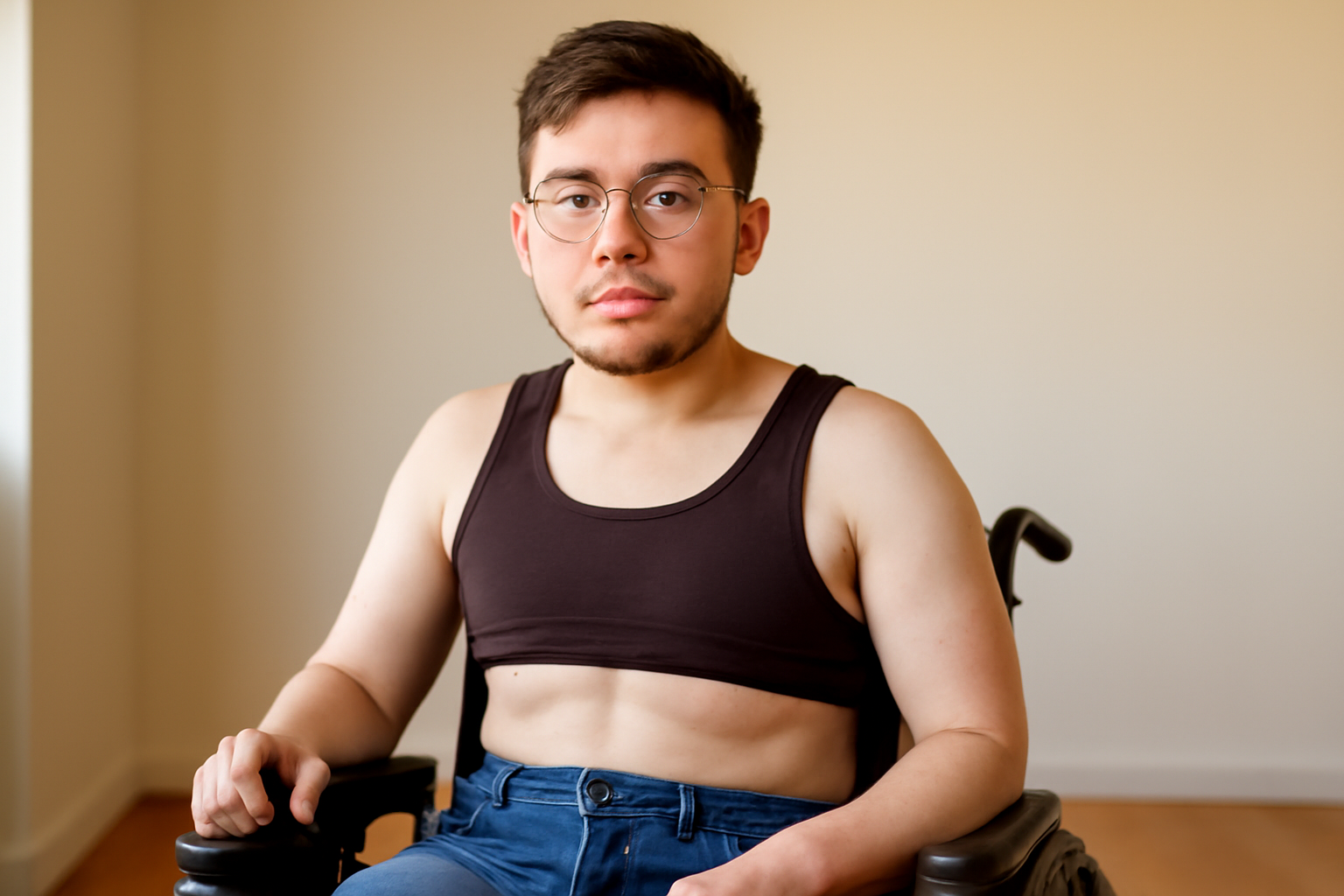
A young transgender man with cerebral palsy is standing up against online hatred after sharing a personal milestone. Micah Leroy, a 19-year-old college student from the University of Minnesota, has courageously spoken out following a barrage of online attacks targeting him after he posted a photograph of himself following top surgery.
Leroy, who has been openly trans since the age of 14, uses his social media platforms to provide insight and education to his followers about living as a disabled transgender individual. Cerebral palsy, a group of lifelong conditions affecting movement and coordination, has not deterred Leroy from pursuing his goal of raising awareness and advocating for his rights and those of others in similar situations.
Last month, Leroy boldly shared an image of himself shirtless, showcasing the results of his gender-affirming top surgery – a procedure many trans-masculine individuals undergo to remove unwanted breast tissue. The post caught the attention of several anti-trans activists, who launched a campaign of misinformation and misgendering against Leroy. Among them were Oli London and Riley Gaines, who falsely claimed that Leroy was incapable of making his own medical decisions. These individuals perpetuated harmful stereotypes, with London alleging that Leroy was coerced into the surgery, and Gaines wrongly asserting that Leroy is "non-verbal," ignoring the fact that he effectively communicates through writing, a speech-generating device, and his own voice, which is understood by those close to him.
Adding to the controversy, U.S. Congresswoman Marjorie Taylor Greene, known for her contentious and anti-trans rhetoric, took to social media to question the legitimacy and ethics of Leroy receiving gender-affirming care. She demanded to know which healthcare professionals had permitted the procedure and how it was financed.
The resulting wave of right-wing outrage inundated Leroy's social media profiles, leading to his accounts being erroneously reported and removed by Meta for supposed violations, including "child sexual exploitation, abuse and nudity." Despite Leroy's appeals to reverse these bans, his efforts have so far been unsuccessful.
Standing Firm in the Face of Adversity
In response to these events, Leroy addressed his audience in a heartfelt video released by MPR News. He affirmed his autonomy and legal standing, stating, "I am my own legal guardian and I am the one who posted it. I am publicly sharing my experience as a disabled adult and as a transgender man with cerebral palsy because I want people to know that it is possible to be disabled and trans."
Leroy expressed his aspiration to influence legislative changes at the state or federal level, emphasizing that the backlash he has faced only strengthens his resolve to advocate for disabled and trans communities. "With all the hate this has stirred up, I believe any publicity is good publicity in furthering my goals," he remarked. "As well as that, this experience has only made me want to speak out more about disabled and trans issues as the negative responses I got have shown a side of the world that is intolerant and discriminatory based on what they perceive others can and cannot do."
Following the viral spread of Leroy's video, Leo Aces, a fellow trans man and disability awareness speaker, condemned the "toxic transphobia and ableism" Leroy has encountered. "Talking from personal experience, as an activist and awareness speaker, who is also a trans man with cerebral palsy, I am horrified by the overall reaction Micah’s video has received," Aces stated. He highlighted how the timing of Leroy’s post, amidst changes to Meta’s policies and the political climate leading up to the presidential inauguration, likely intensified the negative response.
The Broader Implications
Aces further emphasized that Leroy’s video acts as a catalyst for a much-needed broader conversation. "The visibility of physical disability and gender identity can attract controversy because [of] the systemic notion that disabled people have less agency," Aces added. This discourse is crucial as it challenges misconceptions and highlights the intersectional challenges faced by individuals like Leroy, who navigate both disability and transgender identities.
Leroy's courageous stand and his willingness to share his journey offer hope and visibility to others who might be facing similar struggles. By continuing to speak out, Leroy and advocates like him are paving the way for a more inclusive and understanding society.
Join the conversation and share your thoughts in the comments below, remembering to keep the discussion respectful. Together, we can work toward a more inclusive and supportive community.
Related Posts
Triumphant Trans Woman Wins Legal Battle and Inspires Others to Stand Up for Their Rights
Breaking new ground: a landmark victory in transgender rights After battling in courtrooms and enduring endless challenges, Diana Portillo, a transgender woman, has secured a monumental victory in her decade-long fight against workplace discrimination. The result? Nearly $1 million awarded in a historic settlement. But this isn't just a win on paper—it represents a powerful precedent in combati [...]
Pride Month in Latin America: Protests and Demands for Equality
**Celebrating Pride and advocating LGBTQ+ rights in Latin America** Pride Month in Latin America was a lively mix where celebration met activism. Communities united, not just throwing a party but making a stand—demanding equality and pushing governments toward better protection and rights recognition. Throughout Latin America, pride events erupted in marches and cultural displays, each with a c [...]
Transgender Erasure Actions Implemented by National Park Service
```html Trump administration's impact on national park service and transgender recognition The Trump administration made notable moves in undermining transgender representation, which included directing agencies like National Park Service not include "T" and "Q" when they refered “LGBTQ” in any official communication. This move seems part a broader plan by this administration aimed at reducin [...]